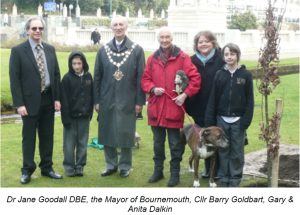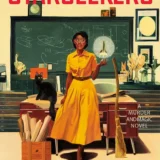Welcome to the Amazing Stories BLOG HORDE INTERVIEWS!
The ASM Blog Horde is a diverse and wonderful species. I have the privilege of talking with all of them, and I get to share those chats with you. In this long-running series, you will have the opportunity to peek inside the minds of the ASM bloggers to to see just what makes them tick.
I hope you enjoy the series as much as I have enjoyed preparing it for you. Please feel free to ask questions, or just let the Horde know you’ve stopped by for a visit.
Bloggers love comments, so let them know you’re out there!
Tonight’s Featured ASM Blogger:
GARY DALKIN is freelance editor, an independent writing consultant, and a former judge of the Arthur C. Clarke Award. He also edited for Vector: The Critical Journal of the British Science Fiction Association. His genre work ranges from interviews for Amazon.co.uk (Sir Arthur C. Clarke, Gerry Anderson, Colin Baker, Sophie Aldred, Ed Bishop), articles for Interzone, SFX, Matrix and DeathRay, and additional interviews with such luminaries as Kevin J. Anderson, Cory Doctorow, Kathleen Ann Goonan, Robert Holdstock and Christopher Priest.
Gary has contributed to every issue of Writing Magazine, the UK’s best-selling magazine for writers, since 1999. He has been published by Empire, Films & Filming, Gramophone and The Los Angeles Review of Books, and has provided content for the BBC, HMV, the London Symphony Orchestra, the Royal Opera House, the Royal Philharmonic and many others. He played a key role in launching the Poole Literary Festival and the international New Media Writing Prize.
Fran Friel for Amazing Stories: Welcome, Gary. Thank you so much for being with us. Please tell us how you became interested in blogging for Amazing Stories Magazine.
GD: I saw that Amazing Stories was coming back through a news story on, I think, SF Scope. Then I saw Steve was looking for bloggers. I’d been writing blog posts for my own website and this seemed like a fantastic opportunity to increase my readership. A lot more people are going to see a post on Amazing Stories than they are on my own site, which considers itself lucky if it gets updated once or twice a month. And who, growing up with Amazing Stories being such a great name in the genre wouldn’t want to write for it? When I’m a wise old elder in the smoking ruins of our civilisation I can tell the awed young folk hanging on my every word as I tell tall tales by the fire, “Yes, it’s really true, once long ago I wrote for Amazing Stories!”
ASM: Amazing Stories Magazine has a wide variety of blogging categories. In what categories can we find your blogs, Gary? And what is your special interest in those topics?
GD: Mainly in Film, SF, Fantasy and Horror Literature. I’ve been a fan all my life. There was a time when I saw 100 or more films a year at the cinema, and I’ve always read omnivorously, partly in those three genres. Though I also read mainstream fiction, the occasional crime novel or thriller, and a lot of non-fiction, including history, biography, politics and books about cinema. Happily I’ve been able to make at least part of my career variously writing about the things I love.
ASM: All writers should be so lucky. Please tell us a little bit about your previous work in publishing. From you bio, it seems you’ve been around the block a bit.
GD: My first work in the genre was as Co-Features Editor (with Andrew Butler) for Vector: The Critical Journal of the British Science Fiction Association. I did that for 30 issues from 1995-2000 and still contribute book reviews. I’ve also been a judge of the Arthur C. Clarke Award and written a lot about genre for places like Amazon (articles and interviews) and magazines like Interzone, Matrix, SFX and DeathRay.
ASM: Impressive work, Gary. How might you categorize the type of blog you enjoy writing here at ASM?
GD: Discursive meanders in and around a particular topic, book, film, genre, filmmaker or writer. If I writer humourously, I tone down my tendency towards satirical humour. Not everyone likes or gets it, and divided by 3000 miles and a common tongue, British humour can easily be lost in translation.
ASM: I’m married to a Scotsman. I can attest to humor or humour in a common language being easily lost in translation. Comical in and of itself sometimes.
As you know, Amazing Stories Magazine focuses on the genres of Science Fiction, Fantasy and Horror. Do you have a favorite?
GD: I don’t have a favourite genre. I rather like work that mixes genres up, or breaks the rules in some way. I think genres are most useful as a marketing label, but there is good and bad, great and terrible work in every field and I like to read and watch a wide variety of stories.
The best writers and filmmakers write and make what they want, and other, less talented people, attach the labels for their own reasons, or to fit a certain agenda. My favourite work, regardless of genre, because you can write a good book or make a good film about anything, is something that is intelligent, imaginative, original, well written or well made and leaves me thinking about it for days or weeks afterwards.
ASM: I feel the same way, Gary. A story that leaves me pondering is a rare treasure.
Who are the authors that keep you coming back to their work? And which of their books would you recommend?
GD: Here are a few in alphabetical order: Iain M. Banks, John Fowles, Mark Helprin, Naomi Klein, Stephen King, David Mitchell, George Orwell, Christopher Priest, H.G. Wells. They all write compelling, imaginative, original, dazzling, breathtaking books. Recommendations, one per author, in order: The Player of Games, The Magus, Winter’s Tale, The Shock Doctrine, The Shining, Cloud Atlas, 1984, The Affirmation, The Time Machine.
ASM: Marvelous list, Gary. What are you reading now?
GD: You Can’t Read This Book: Censorship in an Age of Freedom by Nick Cohen. Actually you can read it. I’m currently at page 138. It won the Polemic of the Year at the 2013 Political Book Awards. It’s a mostly excellent defense of (sad that we need one) and argument for, the non-negotiability of freedom of speech if you are to take the notion of liberal democracy seriously. There are a few easily contestable sweeping statements, but overall it is a very worthwhile corrective to much of the cowardliness and hypocrisy of the left in recent years. And I say that as someone who leans to the left. Not that Cohen gives much comfort to the right either. He’s pretty lacerating.
 ASM: Are you a genre movie fan? What are your favorite titles? And have you seen any lately that you would recommend for us?
ASM: Are you a genre movie fan? What are your favorite titles? And have you seen any lately that you would recommend for us?
GD: I’m a film fan. I’ve written a lot about cinema for various places, and interviewed assorted filmmakers, including Sir Arthur C. Clarke, and I edited the website (now defunct but archived) Film Music on the Web for several years. If it wasn’t for seeing 2001: A Space Odyssey when I was eight, I probably wouldn’t be giving this interview now. So that’s a favourite. Other SF titles would be Inception and Blade Runner. In Fantasy, Excalibur, Legend, The Return of the King. In Horror, Carrie, Don’t Look Now, The Shining.
I don’t see much at the cinema now. The tickets are too expensive, the seats too uncomfortable, the audiences too noisy, the projection and general presentation too often wretched. But I’ve thoroughly enjoyed The Awakening, The Cabin in the Woods and Never Let Me Go on Blu-ray recently. Even Tron Legacy was surprisingly fun, considering the original was very dull.
ASM: Oddly, 2001 had a similar effect on me. Classical music and writing became my vocations; both sparked by that amazing film. I knew I liked you, Gary.
So, where on the planet (or off the planet) are you from originally? Where are you now? And where would you like to be?
GD: Yorkshire. Dorset. The Blue Ridge Mountains, North Carolina.
ASM: What’s your day job, Gary?
GD: Independent writing consultant, which is a way of saying in three words that I do all sorts of things to do with writing, from proofreading to manuscript critique and structural editing. Sometimes I work for publishers, sometimes for individual writers who want to be sure their work is as good as possible before submitting it to an agent or publisher, or before self-publishing. I also write magazine articles, conduct interviews and do the occasional bit of ghost-writing. So, if anyone out there needs some help with their manuscript, whatever it might be, get in touch. I’m very friendly.
ASM: Please tell us something about yourself most folks might not know.
GD: I work (as does my wife) as a volunteer with Dr Jane Goodall organising events for her in her hometown of Bournemouth, here in the UK. We both grew-up admiring her enormously. You can read much more about this side of my life on my website, and on the Facebook page.
ASM: That’s amazing, Gary. Ms. Goodall is a living legend, and her work is so very important. I’m very glad to hear you and your wife are a part of such a wonderful organization.
Now, beside the Goodall work, what is your “secret” pleasure or obsession?
GD: Film music. It is the most undervalued, overlooked and misunderstood aspect of cinema. It is almost impossible to have a great film without a great score. In fact, it is the addition of a great score which often transforms what might otherwise just be a very good film into a masterpiece. Imagine Star Wars, Blade Runner or Inception with routine, ordinary scores, or just with completely different music. They would be something else entirely. And nowhere near as good.
ASM: I completely agree, Gary. Please tell us what personal projects you’re working on?
GD: I’m currently editing an anthology for which I commissioned a dozen top SF writers to each pen an improbable story on a particular theme. The authors represent each side of the Atlantic equally and are equally divided between men and women.
The stories range from Victorian London to another world. Between them the contributors have won every award in the field, most of them several times over. I can’t say any more about it at the moment.
ASM: Sounds very juicy. I’ll be keeping an eye out for that one.
Do you have a favorite podcast or radio drama, Gary?
GD: I’m a fan of Desert Island Discs, which starting in 1942, is the UK’s longest running radio programme. It is available in a podcast version.
ASM: Which of your blog titles would you recommend to our readers to give them a taste of your work?
GD: My first post, “Personal Best,” is a good introduction in that it’s just me writing about some of my favourite books.
I think “Cloud Atlas Shrugged” may be by best post so far. It’s a polemic about something I feel very strongly about, the way genre cinema is being ruined by endless franchises and remakes.
ASM: Which of your fellow bloggers at Amazing Stories would you recommend to our readers?
GD: I don’t really want to pick individual people out because everyone is doing a fantastic job and I’ve read a lot of great posts on Amazing Stories already. That said, I will mention one blogger, but only because I suggested to him that he might like to write for the site. He is a writer, fiction and non-fiction, and someone I’ve worked with in the past and who is really very talented. Anyway, his name is Alistair Savage. He did a really good interview with Ian Gibson, the artist on the 1980’s comic series, Halo Jones.
ASM: Where else can our readers find you on the Web?
My website: www.tothelastword.com
Twitter: @Gary_Dalkin
ASM: It’s been a genuine pleasure talking with you, Gary. Thank you for sharing so generously with our readers.
Dear Amazing Readers, thank you for being with us. I hope you’ve enjoyed tonight’s interview. Please come back next week for another featured blogger in the Amazing Stories Blog Horde Series.
We’ll keep the light on for you!
Wickedly Yours,
FRAN FRIEL is a two-time Bram Stoker Award Finalist and winner of the Black Quill Award. She enjoys life with her husband and her dog by the beach on the Central Coast of California, where she also serves as staff for Alice the cat. You can follow Fran’s latest antics here at Facebook or at Twitter, and Fran Friel’s Yada Feast.










